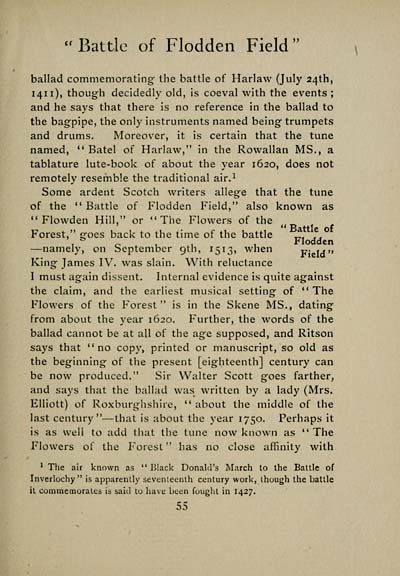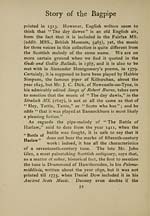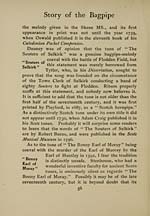Inglis Collection of printed music > Printed text > Story of the bagpipe
(81) Page 55
Download files
Complete book:
Individual page:
Thumbnail gallery: Grid view | List view

-Battle of Flodden Field"
ballad commemorating- the battle of Harlaw (July 24th,
141 1), though decidedly old, is coeval with the events ;
and he says that there is no reference in the ballad to
the bagpipe, the only instruments named being trumpets
and drums. Moreover, it is certain that the tune
named, " Batel of Harlaw," in the Rowallan MS., a
tablature lute-book of about the year 1620, does not
remotely resemble the traditional air. 1
Some ardent Scotch writers allege that the tune
of the " Battle of Flodden Field," also known as
" Flowden Hill," or "The Flowers of the
Forest," goes back to the time of the battle „, , ,
to 1 . , Flodden
— namely, on September 9th, 15 13, when p. .,,,
King James IV. was slain. With reluctance
I must again dissent. Internal evidence is quite against
the claim, and the earliest musical setting of " The
Flowers of the Forest" is in the Skene MS., dating
from about the year 1620. Further, the words of the
ballad cannot be at all of the age supposed, and Ritson
says that "no copy, printed or manuscript, so old as
the beginning of the present [eighteenth] century can
be now produced." Sir Walter Scott goes farther,
and says that the ballad was written by a lady (Mrs.
Elliott) of Roxburghshire, " about the middle of the
last century" — that is about the year 1750. Perhaps it
is as well to add that the tune now known as " The
Flowers of the Forest" has no close affinity with
1 The air known as " Black Donald's March to the Battle of
Inverlochy" is apparently seventeenth century work, though the battle
it commemorates is said to have been fought in 1427.
55
ballad commemorating- the battle of Harlaw (July 24th,
141 1), though decidedly old, is coeval with the events ;
and he says that there is no reference in the ballad to
the bagpipe, the only instruments named being trumpets
and drums. Moreover, it is certain that the tune
named, " Batel of Harlaw," in the Rowallan MS., a
tablature lute-book of about the year 1620, does not
remotely resemble the traditional air. 1
Some ardent Scotch writers allege that the tune
of the " Battle of Flodden Field," also known as
" Flowden Hill," or "The Flowers of the
Forest," goes back to the time of the battle „, , ,
to 1 . , Flodden
— namely, on September 9th, 15 13, when p. .,,,
King James IV. was slain. With reluctance
I must again dissent. Internal evidence is quite against
the claim, and the earliest musical setting of " The
Flowers of the Forest" is in the Skene MS., dating
from about the year 1620. Further, the words of the
ballad cannot be at all of the age supposed, and Ritson
says that "no copy, printed or manuscript, so old as
the beginning of the present [eighteenth] century can
be now produced." Sir Walter Scott goes farther,
and says that the ballad was written by a lady (Mrs.
Elliott) of Roxburghshire, " about the middle of the
last century" — that is about the year 1750. Perhaps it
is as well to add that the tune now known as " The
Flowers of the Forest" has no close affinity with
1 The air known as " Black Donald's March to the Battle of
Inverlochy" is apparently seventeenth century work, though the battle
it commemorates is said to have been fought in 1427.
55
Set display mode to: Large image | Transcription
Images and transcriptions on this page, including medium image downloads, may be used under the Creative Commons Attribution 4.0 International Licence unless otherwise stated. ![]()
| Special collections of printed music > Inglis Collection of printed music > Printed text > Story of the bagpipe > (81) Page 55 |
|---|
| Permanent URL | https://digital.nls.uk/94510148 |
|---|
| Description | Scottish and English songs, military music and keyboard music of the 18th and 19th centuries. These items are from the collection of Alexander Wood Inglis of Glencorse (1854 to 1929). Also includes a few manuscripts, some treatises and other books on the subject. |
|---|
| Description | The Glen Collection and the Inglis Collection represent mainly 18th and 19th century Scottish music, including Scottish songs. The collections of Berlioz and Verdi collected by bibliographer Cecil Hopkinson contain contemporary and later editions of the works of the two composers Berlioz and Verdi. |
|---|

